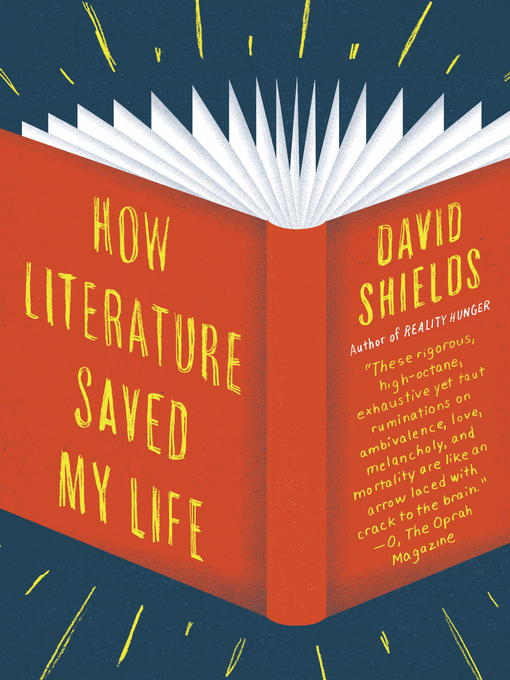
How Literature Saved My Life
کتاب های مرتبط
- اطلاعات
- نقد و بررسی
- دیدگاه کاربران
نقد و بررسی

Starred review from March 25, 2013
Title notwithstanding, Shields (Reality Hunger) has composed not a paean to the glories of narrative or language, but a work that sits somewhere between essay and memoir, resisting easy expectations. Though it is about books, Shields's focus (if it can be called focused at all) is squarely on the contradictions and impasses inherent to literature and language. He comes at his topic askance. Winding through personal anecdotes, some literary criticism, and yes, some praise of beloved texts, the short passages that make up the book sometimes hang together in a traditional rising-action manner and other times they're intentionally erratic. The book teaches the reader how to read it and the result is a slow but intriguing accrual of ideas, which ends up feeling simultaneously irksome and captivating as well as truer than a more straightforward telling might have been. This is both the work's strength and raison d'etre. Shields, as narrator, comes off as terrifically self-involved, extremely well-read, and altogether fascinating. We seem to know him pretty well by the endâwe've been tussling with him all alongâeven though at the same time we understand how compromised this knowing must be. We are saved and not; the literature doesn't become transcendent, just the best tool available.

November 15, 2012
Essayist and fiction writer Shields (Reality Hunger: A Manifesto, 2010, etc.) turns quotation, memory, anecdotes and considerations of film, literature, love and death into a collage that enables introspection. The author, who stuttered throughout childhood, initially regarded writing as an ideal outlet; now, in his mid-50s, he writes "to feel as if, to the degree anyone can know anyone else," he has connected with his readers. With a frequently self-deprecating yet engaging tone, the author employs the act of accrual in hopes of guarding against "human loneliness," and in doing so, creates a personal, modern version of the medieval commonplace book. For the bibliophile, references to authors such as Ben Lerner, E.M. Cioran, Jonathan Safran Foer, Annie Dillard, Sarah Manguso and David Foster Wallace, among others, will appeal as voices intersecting on the page. For fellow creative-writing practitioners, how Shield fashions his own anxieties and persona into brief essays provides an alternative model for writing on selfhood, revealing the author's struggle in oblique ways. Concerned as much with methods of construction and questions of genre as with subject, Shields meters out nuggets of revelation amid explications of both classical and popular subjects, from Prometheus to Spider-Man. The author's circuitous approach may frustrate some readers. However, it is the sometimes-failed attempts to articulate the ways in which "life and art have always been everything" to him that prove fascinating. The book defies easy categorization (as have others of Shields' works): It is both a paean to the power of language and a confrontation with the knowledge that literature can't, after all, fulfill deeper existential needs. A work of contradictions, subversions, depression, humor and singular awareness; Shields is at his finest when culling the work of others to arrive at his own well-timed, often heartbreaking lines.
COPYRIGHT(2012) Kirkus Reviews, ALL RIGHTS RESERVED.

December 15, 2012
As the title suggests, the ever-goading, line-crossing Shields, riding high on the hubbub over his call for appropriation in Reality Hunger (2010), offers another mash-up of memoir and literary criticism. Though he veers off into annoying sexual braggadocio, he does offer telling glimpses into formative aspects of his life, such as his preference as a boy for watching rather than playing baseball, and why, for him, writing is bound up with stuttering. He critiques movies and television and muses on why we were gleeful over Tiger Woods' fall, an inquiry that deepens into an energetic analysis of our tragic flaw, our impulse to self-destruct. Shields reiterates his call for nonfiction that explores our shifting, unstable, multiform, evanescent experience in and of the world and analyzes an array of writers, including Jonathan Lethem, Geoff Dyer, Renata Adler, and Annie Dillard. Praising books that are candid beyond candid, he presents an intriguing annotated roll call of fifty-five works I swear by. Shields is an invaluable mind-sharpener; as you read, you argue with him, thus affirming the passion literature arouses and sustains.(Reprinted with permission of Booklist, copyright 2012, American Library Association.)

























دیدگاه کاربران